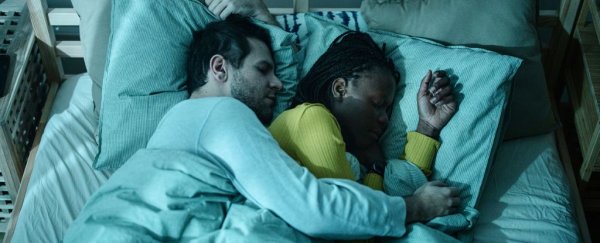Sleep Well -- Together
"Sleeping with a romantic partner or spouse shows to have great benefits on sleep health including reduced sleep apnea risk, sleep insomnia severity and overall improvement in sleep quality."Brandon Fuentes, researcher, University of Arizona"Very few research studies explore this, but our findings suggest that whether we sleep alone or with a partner or family member may impact our sleep health.""We were very surprised to find out just how important this could be.""Even though you're sleeping next to someone who may snore and roll around, it did something that was just beneficial.""What's interesting, it's not just that someone was there because when we asked the question about a child, the answers were very different.""Is it because the reason the child's in the bed is because things are stressful? Is it because children move around more during the night or are more likely to kick you? Who knows?"Michael Grandner, director, Sleep and Health Research Program, University of Arizona

Sharing a bed, according to a new research study, promotes longer, more restful sleep, is linked to lower depression anxiety and stress, and results in greater satisfaction with life, overall. Researchers at the University of Arizona surveyed 1,007 adults of working age and made the discovery that people who sleep with a partner tend to fall to sleep more quickly and were less likely to experience insomnia or general fatigue while also bearing less of a risk of sleep apnea.
In the past ten years in Britain, there has been a doubling of the number of couples living together but sleeping separately. One in six couples (representing 15 percent of the total) prefer to sleep singly at night, according to the National Bed Federation. Additionally, close to 90 percent of people choosing to sleep separately actually sought out a separate bedroom.
Last year, a U.K.-wide survey for the Sleep Charity found that the highest proportion of couples sleeping apart is in Northern Ireland, at 21 percent. At the other end, nine percent of couples in the South East made that choice. The longest married couples appeared likelier to decide for separate beds; 22 percent of those over 65 make that choice, while among couples between the ages of 18 and 24, none chose a solitary sleep arrangement.
Needless to say there might be a practical, and convenient reason for that separation of age groups; when the sex drive is strongest at a younger age sleeping alone might not necessarily appeal, whereas in older age groups with a natural fall-off in the sexual drive's urgency and frequency, older people make the choice to sleep singly.
According to The Sleep Charity it was "quite sensible to sleep apart if your partner causes you disturbed sleep on a regular basis". Poor sleep can result in conflicts, reveals a University of California study, leading experts to believe that preferring nights free of disturbances might improve relationships. Still, the latest research affirms that people who sleep singly are more likely to be tired, depressed and anxious.
Make of that what you will...
 |
| A new study suggests that adults who share their beds with a partner have less severe insomnia, less fatigue and more sleep time. Photo by Giuseppe Ruzzolini/Wikimedia Commons |
Labels: Benefits of Sleeping Together, Couples, Research, Sleep Studies

0 Comments:
Post a Comment
<< Home